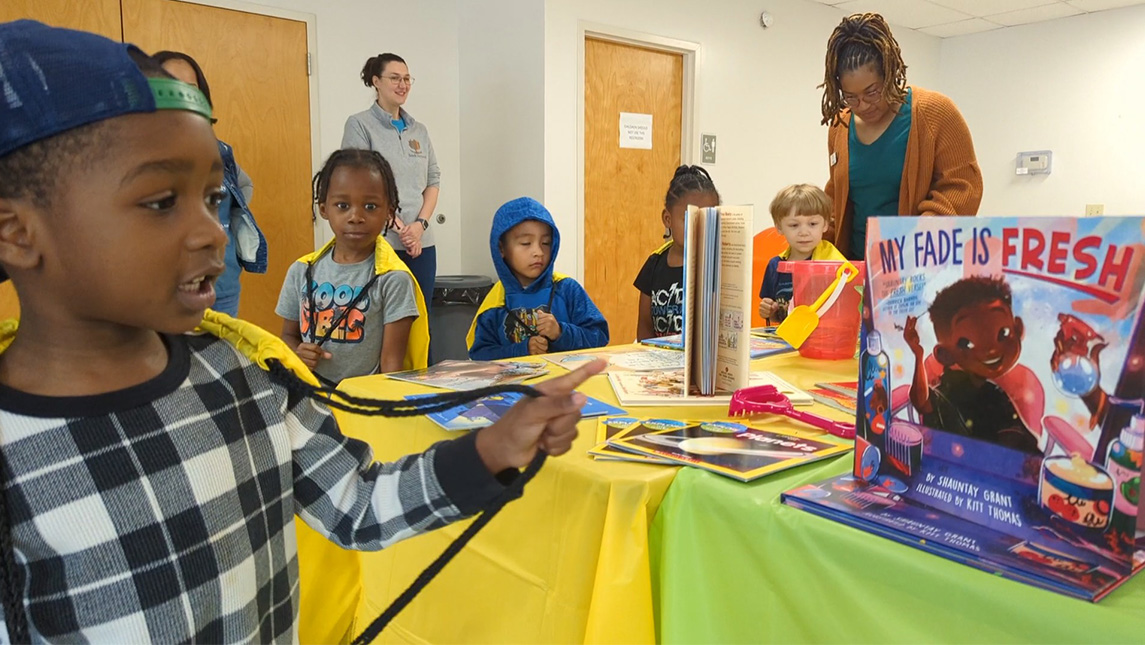When many teachers feel compelled to leave their job, it’s not because they’ve lost a love for teaching or stopped caring about students.
Dr. Tyla Ricks ’23 learned, while working with early care educators for her dissertation at UNC Greensboro, that their departures are largely driven by low pay and burnout. “They don’t necessarily leave the field,” she says. “They leave to go to another program that may pay a little bit more.”
Ricks says since the pandemic, educators have felt pushed to the brink. The expiration of COVID-era stabilization grants for childcare this month adds to that uncertainty.
“The question has become, ‘What’s next?'” she says.
Ricks also speaks from personal experience. She spent five years teaching in early care and education, working in Atlanta, Georgia and Greenville, North Carolina, until she felt burnt out.
“I remember leaving the classroom, and I said, ‘I still want to impact the classroom, but in a different way,'” she says.
Ricks came to UNCG’s Department of Human Development and Family Studies to get her PhD. “I wanted to focus on how we can better equip teachers to personally take care of themselves while they’re in the classroom.”
Her research introduced her to a local organization, Ready for School, Ready for Life in Guilford County, with whom she is now helping to craft a positive answer to “What’s next?” in education.
Personal goals Form A Bigger Picture
While at UNCG, Ricks conducted a book study – funded by the Administration for Children and Families – with early care and education teachers in Guilford County. The subject of the book was teacher resilience.
Her participants answered questions related to their perception of resilience, their support networks, and what they thought others expected from them. As they progressed through the book, they began to talk about what they wanted to change.
The teachers opened up to Ricks about something they don’t often get to address – their own health and wellbeing. Ricks says, “Normally, when you hear about teachers and their goals, it’s in relation to the classroom. But these teachers wanted to talk about setting personal goals.”
Their conversations about exercise, diet, and de-cluttering helped Ricks see the bigger picture. “I’m giving them the tools to address wellbeing and resilience, but if their environment doesn’t change, then how much of a help or support can that really be?” she says. “Wellbeing needs to be embedded in everything: their programs, professional development opportunities, and policies overall.”

Ricks also took up an assistantship working with teachers and directors from three childcare centers to assess their work environment. “That project was funded by Ready for School, Ready for Life,” says Ricks. “Someone from my assistantship encouraged me to apply to that organization, and so I did.”
Ready, Steady, Go!
Ricks is a continuous quality improvement specialist for Ready for School, Ready for Life, also known as Ready Ready. The non-profit partners with more than 100 community organizations, among them UNCG’s Center for Youth, Family, and Community Partnerships. By emphasizing community-wide collaboration and identifying gaps in care, Ready Ready makes it easier for the people who want to help reach the people who need that help.
“We work to help build a system of care,” Ricks says. “I’m not working directly with teachers or working with children as a teacher, but I am working with organizations as a whole who help young children and families.”
For example, Ready Ready teamed up with Book Harvest for “Books on Break,” an event for children to pick up free books to take home before the summer break.
As the name Ready for School, Ready for Life implies, they also support the physical, social, cognitive, and communication skills that will carry children beyond a classroom. “For example, we had an organization come to us who is in need of car seats,” says Ricks. “We try to assess the needs of the community, which are ever-changing. We try to figure out a way or make our partner organizations aware of that need.”
Showing her work
Ricks’ research at UNCG is also making sure one subset of educators does not get overlooked. In February, two months after her doctoral hooding at UNCG’s Graduate Commencement ceremony, she took her findings to a place where it might be seen by advocates and policymakers.
She was invited to return to Atlanta for the conference “Advancing Research On African American Families In Economically Marginalized Communities,” hosted by the Institute for Research on Poverty and the National African American Child & Family Research Center.
Ricks’ presentation “Insights on Head Start Educators’ Wellbeing: Amplifying the Voices of Black Educators” drew from the book study she did while at UNCG. “The majority of my sample were women of color,” she says. “I was able to present the things they said throughout the book study, aligning it and seeing how other research talked about women of color in early care and education.”
Back in Guilford County, Ricks sees her goals play out every time she goes to an event made possible by Ready Ready. “Going to ‘Books on Break’ and seeing children light up, because they’re getting five free books, that was very rewarding,” she says.
There is no short or easy answer to “What’s next?” for educators, but Ricks has never shied away from embracing a challenge.
“We’re not only trying to help our partners accomplish their initiatives,” she says. “We’re trying to hear their voice, to see what they’re seeing. They’re the ones in the community, helping parents, helping children, helping families.”
Story by Janet Imrick, University Communications
Photography courtesy of Dr. Tyla Ricks, Ready for School, Ready for Life




